Introduction to Free Range hunting South Africa
The purpose of this article is to describe our hunting areas and concessions and the type of true free range hunting we conduct. Our hunting safaris in South Africa offer hunters a memorable adventure through exceptional country, with vast free range areas and scenic landscapes that provide the perfect setting for hunting animals in their natural, unfenced habitats, including opportunities to pursue exceptional trophy quality animals.

Africa’s unique and iconic wildlife, along with South Africa’s reputation as a premier hunting destination, make these trips truly special. We offer all inclusive, fully guided packages tailored for our clients, ensuring every hunter enjoys exceptional service and hospitality from our friendly guys and expert guides. The professionalism and dedication of our camp staff further enhance your experience, providing a high-quality and authentic safari adventure.
Table of Contents
Nick Bowker is recognized as a reputable provider of authentic, free-range hunting experiences in Southern Africa, committed to ethical and sustainable practices. Our hunting packages offer hunters a variety of opportunities for all skill levels, making this a suitable adventure for the whole family, with activities and accommodations designed for all ages.

Whether you prefer bow hunting, gun hunts, or the challenge of hunting with dogs, our hunts take place on private land and in large, low-fenced conservation areas in Bedford known for their diverse indigenous wildlife and status as premier free-range hunting destinations. The region is easily accessible, with Port Elizabeth serving as a key entry point for hunting safaris in the Eastern Cape.

Our management practices focus on sustainable populations, with careful attention to food sources that support wildlife and improve hunting success, especially during the winter seasons. Hunting in Southern Africa typically occurs during the cooler months from March through October, but hunting is available year round in many areas, providing flexibility for hunters to plan their safari at any time.

The outcome of a hunt may result in a successful kill, which is celebrated as part of the tradition. Our services offer great value for money, and we pride ourselves on providing an all inclusive hunting trip that meets the needs of every client, while maintaining a commitment to true free range hunting in large, unfenced conservancies.

We hunt on low-fenced ranches with four-foot barb-wired fences to keep sheep and cattle. Plains game primarily moves at will over and through these low fences.
We do not hunt in traditional high-fenced game farms where we drive on the same roads daily and shoot games from the truck.
We have access to over 2 million acres of farmland for hunting in and around Bedford.
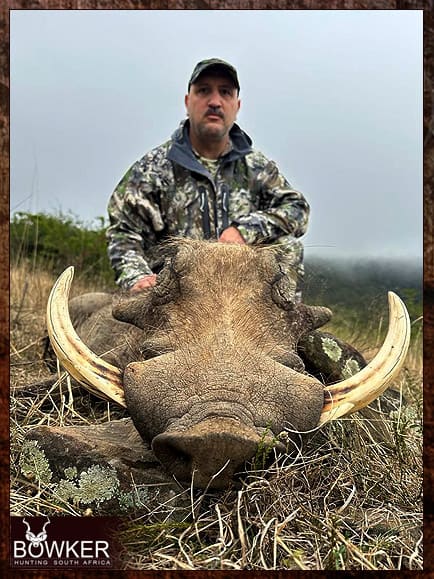
Bedford has a unique topography with mountains, plains, valley bush-veld, and savanna. This results in a wide variety of plains game with an extremely high density of animals
The landowner (Rancher) owns all game residents on their property. This includes transient animals.
The local farmers manage the animals well, as they have a vested interest and are paid per animal.

They also keep the venison, which they can sell. There is a thriving venison market in South Africa. Nothing goes to waste. Even the bones are turned into bone meal.
For certain species, we do enter high-fenced game farms. Alternatively, when we struggle to shoot a specific trophy towards the end of the hunt, we may visit a high-fenced game farm to ensure you get your animal package.
See a detailed list of animals below and related discussions on how and where they are hunted.

Free Range Hunting versus Free Roaming
A lot has been written about Free Range Hunting and Fair Chase Hunting. Free-range hunting can be defined as keeping in natural conditions with freedom of movement, often on private land or private property. Also, no human-made barrier prevents the animal’’s movement, allowing the hunt to take place in vast, scenic country that offers a true wilderness experience.
Another concept is “Free-Roaming” in South Africa because the animals are born, bred, live, and die on the property. In these environments, herds of animals move naturally, and hunting pressure is managed to ensure a quality experience for each hunter.

Wilderness Hunting in Africa
If you are looking for a true wildness hunt, you will need to hunt in Mozambique, Zimbabwe, and Tanzania. In these areas, you will be hunting without any fences or human-made obstacles, such as public roads.
This remoteness comes at a cost with expensive day fees being mandatory as well as extra time and costs to get to these wilderness areas.
In particular, these costs come before you have even seen an animal. For many, the cost and time are prohibitive. As a result, South Africa’s reputation as the premier safari hunting destination in the world continues to grow.

Hunting Locations in South Africa
South Africa stands out as one of the world’s most diverse and rewarding destinations for free range hunting, offering hunters a true taste of Africa’s wild beauty. The Eastern Cape, renowned for its rolling hills and sweeping vistas, is a premier plains game hunting destination where hunters can pursue a wide variety of species in their natural habitats.
This region is home to some of the largest free range conservancies in the country, such as the Baviaansriver Conservancy, and the rugged Winterberg Mountains. These vast free range areas are carefully managed to maintain low hunting pressure and exceptional trophy quality, making them ideal for hunters seeking a more challenging hunt and an authentic African hunting safari.

In these free range hunting areas, animals occur naturally and roam freely across the landscape, with minimal interference from human-made barriers. While cattle fences and high fences on neighboring properties can sometimes limit the movement of certain species, the vast majority of game in these conservancies are truly free ranging, thriving under natural conditions. Careful management ensures that populations remain healthy and sustainable, supporting both conservation efforts and the long-term appeal of these hunting grounds.
Whether you’re drawn to the open plains, the dramatic mountain backdrops, or the rolling hills of the Eastern Cape, South Africa’s hunting locations offer something for every hunter. The combination of breathtaking views, abundant game, and expertly managed conservancies creates the perfect setting for unforgettable game hunting safaris in Africa.
Low Fenced Hunting
These areas do not have high fences but rather four-foot barbed wire fences designed to stop sheep and cattle movement. Consequently, the vast majority of animals can move and roam at will, allowing natural herd behavior to occur as groups of animals travel across the country. Certain animals, such as wildebeest, will be held in check.
These non-high fenced areas are often private property belonging to the local farming community. Outfitters who huntexclusively in these areas are often farmers and have dual income from farming and outfitting. For the hunter, this means access to private land with low hunting pressure, increasing the chances of encountering mature game. Farmland also provides important food sources for wildlife, attracting animals to these areas.
You will struggle to find a property in South Africa or Namibia with no fences somewhere along the line, be it a park border, a high fence on a neighboring property, or a barrier to public roads. Hunters may use a stand as a strategic vantage point, and hunting methods can include gun, bow hunting, and even the assistance of dogs. Success often requires the hunter to wait patiently for the right moment.

High Fenced Hunting in Game ranches
The majority of hunting in South Africa is conducted behind high fences. The size of the high-fenced areas varies greatly. High fencing is often a necessity for Outfitters from an economic perspective.
For these typically larger, high-fenced outfitters, outfitting is often their only source of income. Generally, free-roaming and fair chase hunting applies to high-fenced outfitters.
These larger, high-fenced outfitters need to replenish trophies due to Hunting and genetics. As a result, South Africa is the most affordable hunting destination in the world. Nowhere else can you hunt so many species at a cost you could not dream about two or three decades ago.

Hunting Conservancies in South Africa
A hunting conservancy is a cooperative model where landowners combine their properties into large, free-range areas that restore ecosystems and support sustainable hunting. By removing internal fences and managing game collectively, conservancies increase biodiversity, strengthen wildlife populations, and create authentic fair-chase hunting experiences.
Conservancies benefit everyone involved:
- Wildlife – healthier herds, genetic diversity, and reintroduction of key species.
- Hunters – access to vast, free-range landscapes and ethical, sustainable quotas.
- Landowners – shared management costs, improved land values, and income from hunting.
- Communities – jobs, training, and conservation-based livelihoods.
The Msenge Conservancy (Bowker Conservancy) in the Eastern Cape is a prime example. Covering 10,000 hectares, it blends wildlife management, ethical hunting of plains game, ecotourism, and conservation initiatives under a formal management plan.
Read the full article here: Hunting Conservancies South Africa – Celebrating Re-wilding
Free Ranging Game
Free Range Kudu Hunting
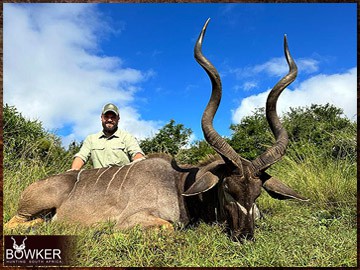
We hunt Kudu outside of high-fenced areas. The East Cape kudu is indigenous and occurs in large numbers throughout the Eastern Cape. Kudu jumps nearly all fences with ease. They will, in fact, jump high fences as well.
Free Range Eland Hunting

We hunt Cape Eland in high-fenced areas and outside high-fenced areas. The Bedford mountains have many free-ranging Eland herds, but big bulls are challenging to hunt. Cape Eland can jump any fence.
Free Range Nyala Hunting

We hunt Nyala in low-fenced areas. Nyalas are not indigenous but were introduced and occur in large numbers in the Bedford area in and around our hunting concessions. Nyala jumps any stock fence.
Free Range Waterbuck Hunting

We hunt Waterbuck outside of high-fenced areas. Waterbuck is not indigenous but has also been introduced, and numbers are plentiful throughout the Bedford area. Waterbuck will jump over or through just about any fence.
Free Range Impala Hunting

We hunt Impala only in low-fenced areas. Impala is not indigenous but has also been introduced and occurs in huge numbers on the surrounding farms at our hunt lodge. Like Nyala, Impala jumps any stock fence.
Free Range Warthog Hunting

Warthogs are hunted outside of high fences. Warthogs are considered indigenous, occur in vast numbers, and are hunted by locals enthusiastically. Warthog smashes through any fence. Not even electric fences can hold them in. The holes at the bottom of stock fences become game trails for many other species.
Free Range Springbok Hunting

Springbok hunts are in low-fenced areas only. They are indigenous, go through fences, and jump the stock fences. By far the most common game animal. The Warthog trails provide the migratory routes for entire herds of springbok.
Free Range Red Lechwe Hunting

Red Lechwe jump any stock fence. We hunt Lechwe free-range and within high-fenced hunting concessions. The numbers of free-ranging Lechwe are good both on the plains and in mountainous areas. They are not indigenous to the Eastern Cape and have adapted well to the Savanna. Their natural home is on the swamps.
Free Range Mountain Reedbuck Hunting

Mountain Reedbuck, like Springbok, goes through and over stock fences. They are indigenous and are found throughout our hunting areas. Nearly every rocky outcrop or draw has a family of Reedbuck. They are hunted in low-fenced areas.
Free Range Cape Bushbuck Hunting

Bushbuck is indigenous to the Eastern Cape. They are hunted in the mountains or along river valleys. They are plentiful, and jumping any stock fence is no problem. All bushbuck hunting is free-range.
Free Range Red Hartebeest Hunting

Depending on availability, Red Hartebeest hunting occurs outside and inside high fence areas. Hartebeest jumps stock fences. They are indigenous to the Eastern Cape and plentiful.
Free Range Grey Reebok Hunting

Grey Rhebok or Vaal Rhebok occurs in the mountains over 5000 feet. They are indigenous and very much free-ranging, similar to the Mountain Reedbuck. All Rhebok hunts are free-range.
Free Range Steenbok Hunting

Steenbok is indigenous to the Eastern Cape, South Africa. They are plentiful, particularly around Hopewell Hunt Lodge. These small antelope go through any stock fence and often use the Warthog holes. We only hunt Steenbok free-range.
Free Range Fallow Deer Hunting

Like many parts of the world, Fallow Deer is an introduced species from England. Fallows are big jumpers, and stock fences are no impediments. Fallow Deer hunts take place in and out of high-fenced areas.
Free Range Grey Duiker Hunting

Similar to Steenbok in size, Duiker also goes through stock fences and uses the Warthog holes as a game trail. In addition to the grey duiker, the region is also home to the blue duiker, further highlighting the area’s rich biodiversity. Grey Duiker are indigenous to the Eastern Cape, and all hunting is free-range.
Free Range Bushpig Hunting

Bushpigs are nocturnal and seldom seen by plains game hunters. Like warthog, getting through fences is no impediment. They are indigenous, and all hunting is free-range.
Plains Game that are impeded by sheep and cattle fences

Cape Buffalo are hunted behind high fences. They were indigenous and have been re-introduced to game farms. Our concession area is in the mountains with very thick brush in a large area. This Buffalo hunt is proper. The bulls are challenging to find and shot at close range. Be prepared to be charged!

Stock fences impede Gemsbok, but they get out mainly through the Warthog holes. They are indigenous to the Eastern Cape. Hunts are conducted in low-fenced areas, primarily in our concession areas, rather than the surrounding farms.

Similar to Gemsbok, Black Wildebeest are impeded by stock fences. Also indigenous to the Eastern Cape. They are hunted in low-fenced areas, primarily on the surrounding farms.

Stock fences also impede Blesbok. Indigenous to the Eastern Cape South Africa. They are true plains game antelope and are hunted in low-fenced farms, including our own farms.

The Burchell’s Zebra and Mountain Zebra are indigenous to the Eastern Cape. Fences impede free movement, and Zebra are hunted in the low-fenced surrounding farms.

Blue Wildebeest are not indigenous to the Eastern Cape, unlike the Black Wildebeest. They have been introduced and are predominantly hunted on local farms in low-fenced areas. Like Black Wildebeest, low fences impede movement, but under pressure, they can jump a low fence.

Giraffes are not indigenous and are a specialist trophy. They are hunted behind high fences where they have been introduced.

Sable antelope are not indigenous and have been introduced by some farmers. We have Sable herds of our own. They can jump low-stock fences. We hunt behind partially raised stock fences.

Common Reedbuck are hunted in high-fenced game farms and are not indigenous to the Eastern Cape. Common Reedbuck jump stock fences.

Roan antelope is an introduced species and is not indigenous. Roan are hunted in high-fenced game farms. Roan can jump a standard stock fence.
Game Species and Conservation
Conservation plays a vital role in the management of game species, ensuring that hunting remains sustainable and responsible for generations to come. Across the globe, from the rolling hills of New Zealand to the vast plains of southern Africa, outfitters and hunters are working together to protect wildlife and their habitats.
In New Zealand, careful management of red stag and fallow buck populations includes setting season dates and bag limits to maintain healthy herds and thriving ecosystems. These measures help balance the needs of hunters with the long-term survival of the species, creating a fun and exciting hunting experience that also supports conservation goals.

Similarly, in southern Africa, conservation efforts focus on preserving natural habitats and promoting ethical hunting practices. Responsible hunting not only provides economic benefits to local communities but also contributes to the protection of Africa’s iconic wildlife and the landscapes they inhabit. By choosing outfitters who prioritize sustainability, hunters can enjoy the thrill of the chase while knowing they are helping to safeguard the future of the game they pursue.
Whether you’re after a trophy red stag in New Zealand or a kudu in Africa, embracing conservation-minded hunting ensures that these exciting adventures remain available for future hunters. It’s a commitment to both the sport and the species, making every hunt not just a personal achievement, but a contribution to the world’s natural heritage.
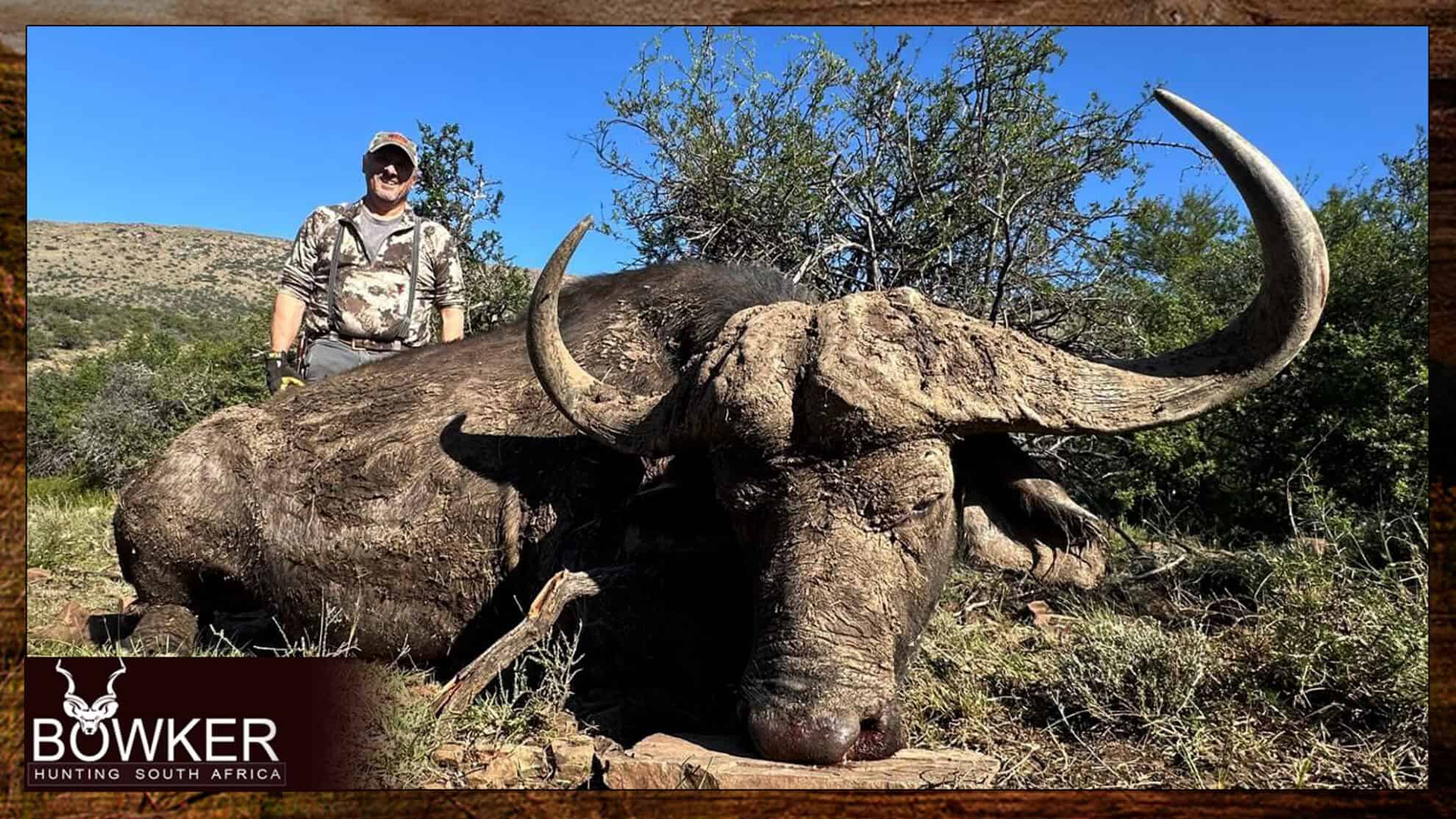
Hunting Outfitters and Guides
Choosing the right hunting outfitter and professional hunter is essential for a successful and enjoyable African hunting safari. A reputable outfitter brings not only expert knowledge of the local terrain and wildlife but also a commitment to ethical hunting practices and conservation. Conservation efforts are enhanced when hunters work closely with local conservation authorities. Experienced professional hunters guide you through every step of the hunt, from tracking and stalking game to ensuring a safe and rewarding experience in the field.
Outfitters like Nick Bowker have built their reputations on providing exceptional service, expert guidance, and access to some of South Africa’s finest hunting areas. Their teams of professional hunters are skilled in reading animal behavior, understanding hunting conditions, and helping hunters of all experience levels achieve their goals. Whether you’re pursuing plains game on a classic safari or embarking on a big game adventure, the right guide ensures that your hunting trip is both successful and memorable.

Ethical hunting practices are at the heart of a quality safari experience. By working with a trusted hunting outfitter, hunters can be confident that their hunts contribute to the long-term sustainability of Africa’s wildlife and support local conservation efforts. The expertise of professional hunters, combined with the thrill of the chase and the beauty of Africa’s landscapes, creates an adventure that is both exciting and deeply rewarding.
For hunters seeking an authentic African hunting safari, partnering with a knowledgeable outfitter and guide is the key to unlocking the full potential of the adventure. From the first day in camp to the final moments of the hunt, you’ll benefit from their experience, passion, and dedication to making your safari a once-in-a-lifetime experience.
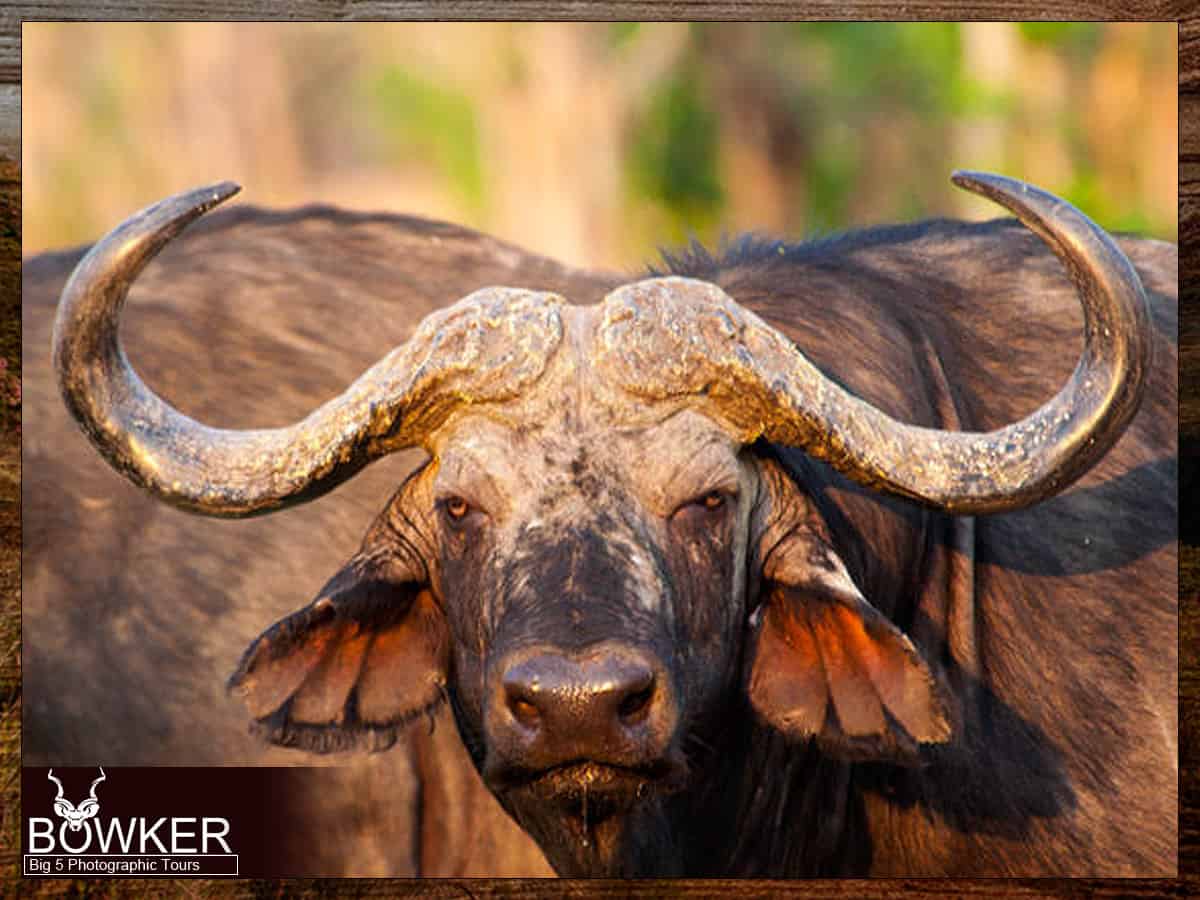
Preparing for a Hunting Safari
Embarking on a hunting safari in South Africa is an adventure that requires thoughtful preparation and a commitment to ethical hunting practices. The first step is to select a reputable hunting outfitter, such as Nick Bowker, known for offering true free range hunting experiences and upholding the highest standards of professionalism. A quality hunting outfitter will provide access to prime free range areas, expert guidance from a professional hunter, and the support of dedicated camp staff to ensure your safety and comfort throughout your stay.
Understanding the hunting conditions is essential for a successful and enjoyable hunt. South Africa’s terrain can be rugged and varied, with weather that changes quickly, so hunters should be prepared for long walks, challenging stalks, and the unpredictability that comes with hunting in natural conditions. Familiarizing yourself with local hunting regulations and laws is also crucial, as it ensures that your hunt is both legal and ethical.
Physical and mental preparation are key to making the most of your hunting safari. A challenging hunt in Africa may involve traversing steep hills, navigating thick bush, and adapting to the demands of the environment. Your professional hunter and camp staff will be there to guide you every step of the way, sharing their expertise and helping you make the most of your time in the field. With the right preparation and a spirit of adventure, your hunting trip in South Africa will be a rewarding and memorable experience.
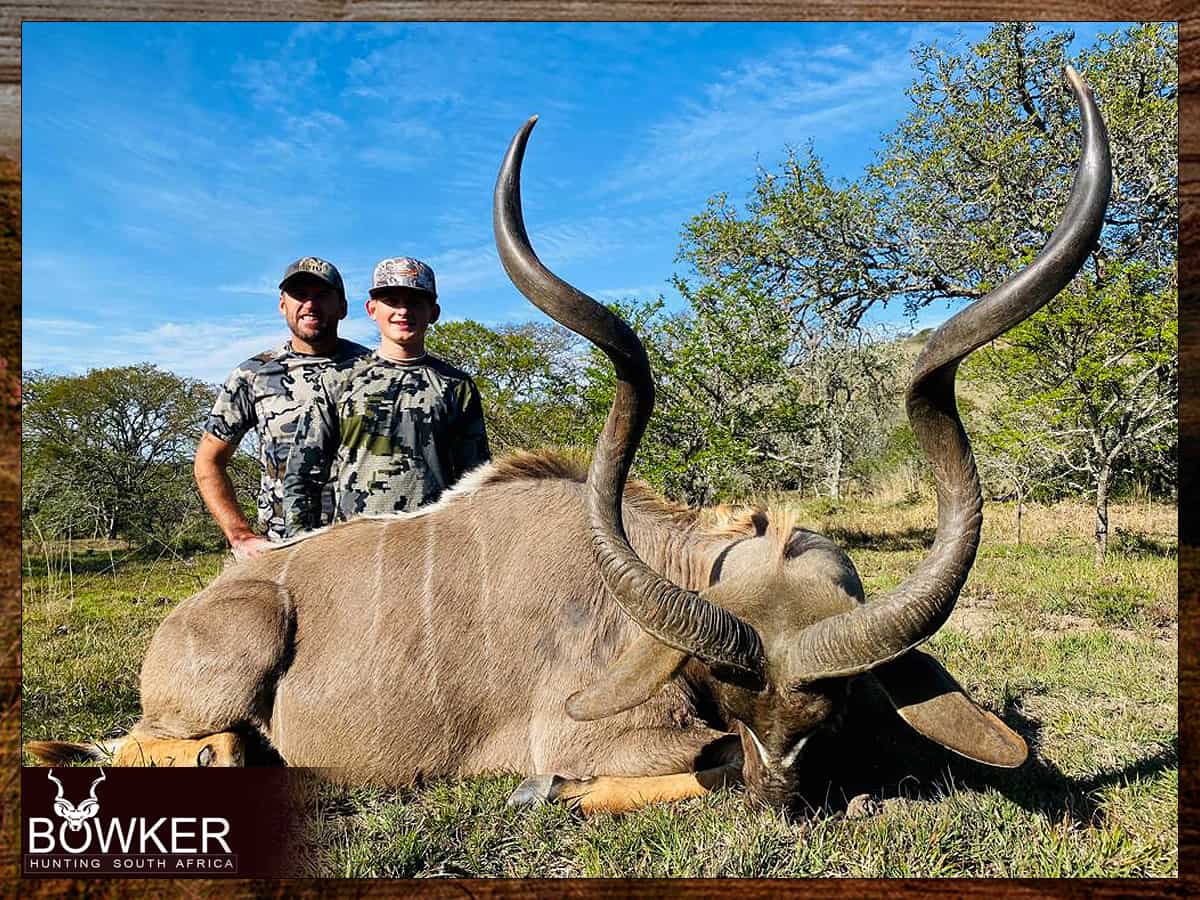
Conclusion
In conclusion, free range hunting in South Africa offers hunters an unparalleled opportunity to experience the wild heart of Africa. With its vast free range hunting areas, diverse plains game populations, and breathtaking views, the Eastern Cape stands out as a top destination for those seeking an authentic and challenging hunting safari. Large free range conservancies provide exceptional trophy quality and a true sense of adventure, while careful management and conservation efforts ensure the long-term sustainability of these remarkable hunting grounds.
By choosing a reputable hunting outfitter like Nick Bowker and preparing thoroughly for your safari, you can enjoy a hunting experience that combines excitement, ethical practices, and a deep connection to Africa’s natural beauty. Whether you’re hunting buffalo, blue wildebeest, or other iconic plains game, South Africa’s free range hunting areas offer the perfect setting for a memorable and meaningful adventure. For hunters seeking a unique and rewarding hunting experience, there is simply no better place than the wild, open spaces of South Africa.
